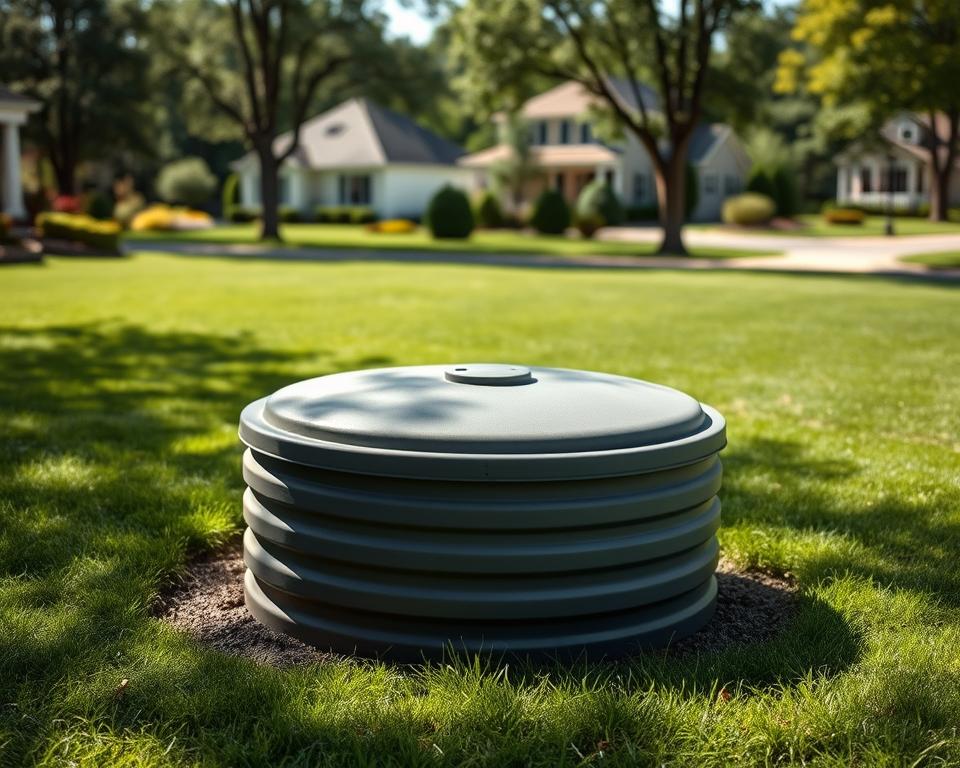Septic System Inspection: Guarantee Your Security
Have you ever considered the value of your septic system and the dangers of its failure? Today, where efficient sewage management is critical, septic system inspections are indispensable. They find issues at an early stage, avoiding health risks and pricey repairs. Especially in rural locations, homeowners must make these assessments a chief concern for property safety and environmental cleanliness.
Significant Points
- Routine septic system inspections are necessary for preventing costly repairs.
- Septic tank assessment can identify problems quickly, protecting health and environment.
- A qualified septic inspection entails thorough examinations by certified inspectors.
- Grasping your septic system can boost its longevity and efficiency.
- Neglecting to inspect can lead to serious health risks and property damage.
Comprehending the Importance of Septic Systems
Septic systems are essential for managing household wastewater, notably where there’s no municipal sewage link. They manage on-site wastewater treatment, keeping harmful pollutants at bay. This procedure is vital for environmental safety.
Regular maintenance and checks are necessary for septic systems to safeguard community health effectively. A system in good condition halts wastewater leaks. These leaks can contaminate water sources, posing to drinking water and community health at risk.
There’s a clear link between a well-managed septic system and environmental protection. Effective operation of these systems is key to minimizing pollution and fostering eco-friendly living with septic tank inspection.
What Happens During a Septic System Inspection
The septic system inspection involves important steps to confirm its functionality and safety. Experts from All in Sanitation carry out a thorough review, focusing on multiple components of the system. They strive to ensure everything is in optimal condition.
During the inspection, technicians inspect the septic tank, looking for any leaks or pipe issues. They measure the septic tank’s liquid levels to guarantee efficient performance. This detailed assessment prevents problems from get worse, preventing contamination and failure.
Understanding these critical steps enables homeowners to maintain their septic systems effectively. By spotting issues early through a proper inspection, the system’s life can be greatly extended. This protects against potential risks.
Key Parts Checked in a Septic System Inspection
A complete septic system inspection addresses key components to ensure its efficient functioning. The initial focus is on the septic tank, a core element of the system. Inspectors assess the tank’s condition, looking for wear or damage signs. They inspect the tank walls, inlet and outlet pipes, and look for any blockages.
Inspectors also evaluate the drain field, essential for filtering effluent back into the groundwater. They look for standing water or unusual vegetation signaling issues. The distribution box’s flow and distribution are checked to confirm consistency across drain lines.
The septic baffle’s health is another critical check. Technicians ensure that the baffles are intact and operate properly, preventing sludge from reaching the drain field. They also measure sludge and scum levels to ensure they are within safe limits.
The inspection’s last stage is assessing the system’s watertight integrity. Inspectors ensure that the tank’s liquid level is normal, avoiding any potential leaks or overflows. This full assessment helps detect minor problems before they become significant repairs, thus protecting the septic system’s health.
| Component | Inspection Target | Importance |
|---|---|---|
| Septic Tank | State of walls, pipes, and obstructions | Critical for waste collection |
| Drain Field | Standing water, vegetation anomalies | Ensures proper effluent filtration |
| Distribution Box | Flow and distribution checks | Sustains balanced drainage |
| Baffles | Soundness and function | Prevents sludge migration |
| Liquid Level | Check of normal range | Prevents leaks and contamination |
Frequent Troubles Detected in a Septic System Inspection
In septic system inspections, experts often find various problems that hurt system efficiency. Chief among them are overfilled tanks, usually resulting from too much water use or unnoticed leaks. This condition stops the system from processing wastewater correctly, causing backups and further issues.
Damage or malfunction in pipes is another typical issue found. Such faults block wastewater flow and can lead to costly fixes if ignored. Clogged filters also pose significant problems, reducing system performance and creating environmental risks.
Lack of upkeep exacerbates these septic problems. Through routine checks, such issues can be identified and addressed early. This preventive approach saves homeowners from hefty repair costs and secures community health.
How Long Does a Septic System Inspection
A typical septic inspection spans from two to 4 hours. Factors like property size and septic complexity impact this duration. Should surprise problems surface or bad weather block access, inspection times may extend. Planning ahead with these timeframes in mind enables homeowners to plan efficiently for a detailed check.
It’s advisable for homeowners to attend the inspection. It gives them to ask questions and understand the inspector’s observations firsthand. Scheduling the visit for a time when full attention can be given enhances the experience and final result.
| Inspection Factor | Time Range |
|---|---|
| Basic inspection | 2 – 3 |
| Complex system | 3 – 4 |
| Unforeseen issues | 4+ |
How Often of Septic System Inspections
Consistent septic inspections are vital to maintain your system’s longevity and performance. It’s generally recommended for homeowners to have their septic system inspected every three years. This frequency may be modified depending on factors like the size of your household, the volume of daily water use, and the system’s age.
Bigger households or homes utilizing garbage disposals might need inspections at shorter intervals. Staying on the right maintenance schedule is vital. It helps detect potential problems early and guarantees your system operates efficiently.
Here’s a helpful table outlining factors that might influence your inspection frequency:
| Factor | Recommended Inspection Frequency |
|---|---|
| Standard Household (2-3 people) | Every 3 years |
| Larger Household (4+ people) | Every 1-2 years |
| Home with Garbage Disposal | Every 1-2 years |
| Older Septic System | Annually |
Adhering to a regular septic maintenance plan delivers peace of mind. It avoids costly repairs and keeps your home safe and sanitary.
Results of Ignoring Regular Septic System Inspections
Not scheduling periodic septic inspections elevates the risk of system failures. Early-stage issues can spiral into larger ones, requiring high-priced repairs. Wastewater backups from these failures threaten homes and the environment, risking groundwater contamination.
Unresolved septic issues put people and pets to harmful bacteria and diseases. Homeowners could sidestep big bills with timely inspections. Overlooking routine maintenance can amplify a small problem into a larger crisis, disrupting your daily life and causing stress.
The financial burden of replacing an entire septic system can be daunting. Homeowners shoulder the full cost. However, ongoing inspections allow early problem detection, stopping issues from worsening. Regular maintenance not only extends the system’s life but also rescues homeowners from potential financial and environmental disasters.
Tips for Homeowners: Maintaining Your Septic System
For homeowners, septic system care is vital for its longevity and function. Following proper maintenance tips guarantees smooth operation and cuts repair costs. Small actions can greatly improve septic tank performance.
Conserving water in the home is important. Small changes like patching leaks and choosing water-saving fixtures lower strain on the system. Households should be conscious of their water consumption.
Correct waste handling is key. Do not flush items such as wipes, feminine hygiene items, and grease – they damage the system’s balance. Dispose of such materials properly, using trash or compost.
Reducing caustic cleaners is also crucial. Household cleaners can harm the beneficial bacteria in your septic tank. Choose eco-friendly cleaning products to preserve this crucial ecosystem.
Frequent inspections on the drain field area are necessary for efficiency. Monitor for saturated soil or standing water, signs of possible problems. These issues demand quick action.
| Action | Rationale |
|---|---|
| Conserve water | Prevents system overload |
| Properly dispose of waste | Maintains balance of the tank |
| Limit harsh chemicals | Protects beneficial bacteria |
| Inspect drain field | Identifies potential problems early |
Embracing these septic system maintenance strategies will sustain your septic care at its best. This secures a functional, enduring system for the future.
Hiring Professional Inspectors
Engaging professional septic inspection services is crucial for homeowners. Companies like All in Sanitation offer detailed septic system evaluations. Their experienced experts make sure no major issue goes unnoticed.
These professional septic inspectors employ state-of-the-art methods to discover problems. This capability is key for ensuring your septic system’s longevity and your property’s health. They share knowledge on how to keep your system functioning well.
Advantages of Working with a Certified Septic Inspector
Working with a certified septic inspector brings major benefits for homeowners. These inspectors have extensive knowledge of local regulations and industry norms. Their expertise secures thorough, accurate inspections, lowering the risk of missing key issues.
These experts have the skills to identify a wider spectrum of potential issues. Due to their advanced training, certified inspectors can detect subtle signs of deterioration or failure. This ability ensures problems are tackled early, cutting homeowners significant costs and preventing severe problems later.
Another significant benefit is the peace of mind they provide to homeowners. Knowing a qualified professional is evaluating their system instills confidence. This assurance about the inspection’s quality adds a layer of security, supporting the system’s reliability.
In conclusion, the benefits of engaging a certified expert for septic inspection clearly surpass any cost involved. These benefits include pinpoint accuracy, early detection of potential problems, and a strong sense of security among homeowners about their septic systems.
The Bottom Line
Regular septic inspections are essential for homeowners who wish to avoid expensive repairs. These checks go beyond mere routine. They emphasize the key function of maintenance in keeping septic systems operating smoothly.
Working with certified experts, such as All in Sanitation, enables homeowners to preserve the effectiveness of their septic systems. This forward-thinking strategy does more than just protect property value. It also bolsters community well-being and environmental health.
Taking timely measures on septic inspections shields your investment. It secures your home remains a protected and welcoming haven for your loved ones.


